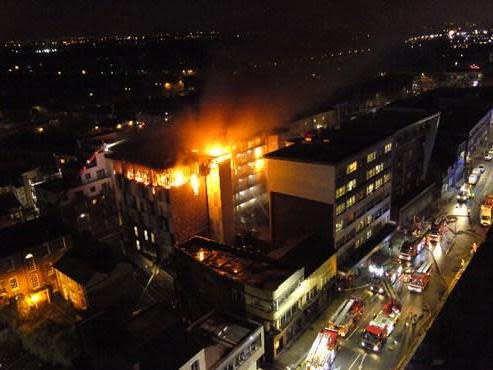Labour says Bolton fire must be 'wake-up call', as government set to miss cladding removal target by 13 years

Labour has called on the government to act urgently to remove dangerous materials from high-rise buildings after a major fire in Bolton raised fresh concerns about safety.
John Healey, the shadow housing secretary, said the blaze should act as a "wake up call" as it emerged that ministers are on course to miss their target for removing the deadly materials by 13 years.
Despite several types of cladding having been found to be dangerous in the wake of the Grenfell Tower fire in June 2017, which killed 72 people, 267 blocks have still not had the materials removed.
The fire at The Cube student accommodation building in Bolton injured two people and saw around 100 residents evacuated on Friday night.
Videos and witness testimonies suggested that the blaze had spread up the exterior of the building in a similar way to the Grenfell fire - the rapid spread of which was blamed on the highly flammable cladding that covered the block.
In the wake of the Grenfell tragedy, ministers said they wanted all dangerous aluminium composite material (ACM) cladding to be removed from social housing buildings by the end of 2019 and private housing blocks by June 2020.
However, official figures released this week revealed that there were still 267 blocks that had not had the cladding removed: 98 social housing blocks and 169 privately-owned blocks.
The figures suggest that the government is on course to miss its target by well over a decade.
In the last year, cladding has been removed from social housing blocks at a rate of less than three buildings a month. At that rate, it would take until October 2022 for the work to be completed on the remaining 267 blocks - almost three years after the deadline.
The rate at which cladding is being removed from private blocks is even slower, at just one per month. At the current rate it would take until October 2033 for the buildings to be made safe - more than 13 years later than the government's target.
Nine in ten private housing blocks have still not had the Grenfell-style cladding removed.
John Healey, Labour’s shadow housing secretary, said: “The serious fire in Bolton should be yet another wake-up call for the Conservatives.
“Two and a half years after the Grenfell Tower fire, there are still thousands of residents in blocks with deadly cladding and the government are set to miss their own targets on cladding replacement. Thousands more residents don’t know whether or not their homes are safe because ministers haven’t done and made public the testing of all suspect materials.
“If reports are right that the cladding has contributed to the fire in Bolton, then the Government has serious questions to answer. Boris Johnson and the Conservatives must act now to make all buildings safe.”
In addition to the ACM panels, other forms of cladding have also been found to be highly flammable following tests in the wake of the Grenfell fire. Estimates suggest that this may affect close to a further 2,000 buildings.
In July, the Commons housing, communities and local government committee criticised the government's approach to ensuring dangerous cladding is removed.
It said: "The government is right to argue that leaseholders should not be forced to pay for the remediation of their buildings, but is wrong to only provide support to residents with a specific type of cladding. The government cannot morally justify funding the replacement of one form of dangerous cladding, but not others.
"There is an unfortunate feeling of deja vu around the government’s approach to non-ACM cladding and a sense that they will inevitably end up paying for it after a short period of prevaricating. In the meantime, tens of thousands of affected residents continue to live in potentially dangerous buildings, or have been sent large and distressing bills for remedial works."
The government had been contacted for comment.
Read more
Students flee as fire ‘crawls up cladding’ at block of flats
